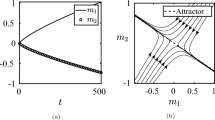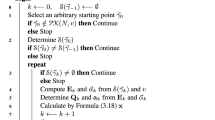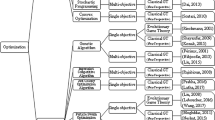Abstract
Team formation plays an essential role in the labor market. In this paper, we propose two bicriteria algorithms to construct a balance between gain and cost in a team formation problem under the streaming model, subject to a cardinality constraint. We formulate the problem as maximizing the difference of a non-negative normalized monotone submodular function and a non-negative linear function. As an extension, we also consider the case where the first function is \(\gamma \)-weakly submodular. Combining the greedy technique with the threshold method, we present bicriteria streaming algorithms and give detailed analysis for both of these models. Our analysis is competitive with that in Ene’s work.

Similar content being viewed by others
References
Anagnostopoulos A, Becchetti L, Castillo C, Gionis A, Leonardi S (2012) Online team formation in social networks. In: Proceedings of the 21st international conference on world wide web, pp 839–848
Anagnostopoulos A, Castillo C, Fazzone A, Leonardi S, Terzi E (2018) Algorithms for hiring and outsourcing in the online labor market. In: Proceedings of the 24th ACM SIGKDD international conference on knowledge discovery and data mining, pp 1109–1118
Badanidiyuru A, Mirzasoleiman B, Karbasi A, Krause A (2014) Streaming submodular maximization: massive data summarization on the fly. In: Proceedings of the 20th ACM SIGKDD international conference on knowledge discovery and data mining, pp 671–680
Bertsimas D, Van Parys B (2020) Sparse high-dimensional regression: exact scalable algorithms and phase transitions. Ann Stat 48:300–323
Bian AA, Buhmann JM, Krause A, Tschiatschek S (2017) Guarantees for greedy maximization of non-submodular functions with applications. In: Proceedings of the 34th international conference on machine learning, pp 498–507
Du D, Li Y, **u N, Xu D (2014) Simultaneous approximation of multi-criteria submodular functions maximization. J Oper Res Soc China 2:271–290
Ene A (2020) A note on maximizing the difference between a monotone submodular function and a linear function. Ar**v preprint ar**v: 2002.07782
Feige U (1998) A threshold of \(\ln n\) for approximating set cover. J ACM 45:634–652
Feldman M (2019) Guess free maximization of submodular and linear sums. In: Proceedings of the 16th international conference workshop on algorithms and data structures, pp 380–394
Friedrich T, Göbel A, Neumann F, Quinzan F, Rothenberger R (2019) Greedy maximization of functions with bounded curvature under partition matroid constraints. In: Proceedings of the 33rd AAAI conference on artificial intelligence, pp 2272–2279
Gargano L, Hell P, Peters JG, Vaccaro U (2015) Influence diffusion in social networks under time window constraints. Theoret Comput Sci 584:53–66
Golshan B, Lappas T, Terzi E (2014) Profit-maximizing cluster hires. In: Proceedings of the 20th ACM SIGKDD international conference on knowledge discovery and data mining, pp 1196–1205
Gong S, Nong Q, Liu W, Fang Q (2019) Parametric monotone function maximization with matroid constraints. J Global Optim 75:833–849
Harshaw C, Feldman M, Ward J, Karbasi A (2019) Submodular maximization beyond non-negativity: guarantees, fast algorithms, and applications. In: Proceedings of the 36th international conference on machine learning, pp 2634–2643
Hu H, Grubb A, Bagnell JA, Hebert M (2016) Efficient feature group sequencing for anytime linear prediction. In: Proceedings of the 32nd conference on uncertainty in artificial intelligence, pp 279–288
Kuhnle A, Smith JD, Crawford VG, Thai MT (2018) Fast maximization of non-submodular, monotonic functions on the integer lattice. In: Proceedings of the 35th international conference on machine learning, pp 2791–2800
Lappas T, Liu K, Terzi E (2009) Finding a team of experts in social networks. In: Proceedings of the 15th ACM SIGKDD international conference on knowledge discovery and data mining, pp 467–476
Liu S, Poon CK (2017) A simple greedy algorithm for the profit-aware social team formation problem. In: Proceedings of the 11th international conference on combinatorial optimization and applications, pp 379–393
Muthukrishnan S (2005) Data streams: algorithms and applications. Found Trends Theor Comput Sci 1:117–236
Papadimitriou CH, Yannakakis M (1991) Optimization, approximation, and complexity classes. J Comput Syst Sci 43:425–440
Qian C (2019) Multi-objective evolutionary algorithms are still good: maximizing monotone approximately submodular minus modular functions. Ar**v preprint ar**v: 1910.05492
Sviridenko M, Vondrák J, Ward J (2017) Optimal approximation for submodular and supermodular optimization with bounded curvature. Math Oper Res 42:1197–1218
Wang Y, Xu D, Wang Y, Zhang D (2020) Non-submodular maximization on massive data streams. J Global Optim 76:729–743
Wu M, Wicker M, Ruan W, Huang X, Kwiatkowska M (2020) A game-based approximate verification of deep neural networks with provable guarantees. Theoret Comput Sci 807:298–329
Yu Q, Li H, Liao Y, Cui S (2018) Fast budgeted influence maximization over multi-action event logs. IEEE Access 6:14367–14378
Acknowledgements
The first and second authors are supported by National Natural Science Foundation of China (No. 11871081) and Bei**g Natural Science Foundation Project No. Z200002. The third author is supported by National Natural Sciences and Engineering Research Council of Canada (NSERC) grant 06446, and National Natural Science Foundation of China (Nos. 11771386, 11728104). The fourth author is supported by National Natural Science Foundation of China (No. 11801251).
Author information
Authors and Affiliations
Corresponding author
Additional information
A preliminary version appeared in the Proceedings of the 9th International Conference on Computational Data and Social Networks, 2020, pp. xiii–xiv.
Rights and permissions
About this article
Cite this article
Wang, Y., Xu, D., Du, D. et al. Bicriteria streaming algorithms to balance gain and cost with cardinality constraint. J Comb Optim 44, 2946–2962 (2022). https://doi.org/10.1007/s10878-021-00827-w
Accepted:
Published:
Issue Date:
DOI: https://doi.org/10.1007/s10878-021-00827-w




